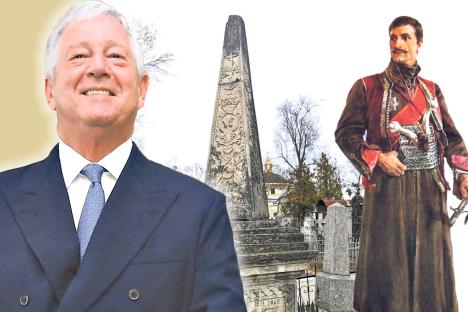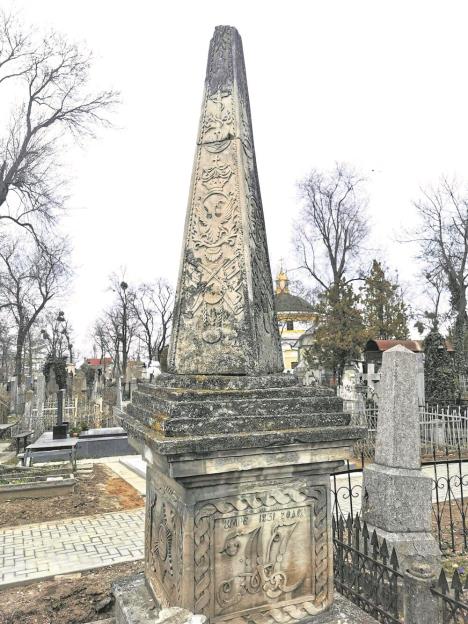CROWN PRINCE ALEKSANDAR KARAĐORĐEVIĆ ON KURIR’S INITIATIVE: The Remains of the Leader’s Eldest Son Soon to Be in Serbia

“The remains of the Leader’s son, Prince Aleksa, are expected to arrive in Serbia by the end of this or the beginning of next year. Another Karađorđević returning to his homeland after so many years! Not just years but decades, even centuries," says Crown Prince Aleksandar Karađorđević in an interview with Kurir, discussing Kurir’s initiative for the transfer of the remains of Karađorđe’s second son, Aleksa (the firstborn, Sima, died at birth), who died in Chișinău in 1830 and is buried there.
What exactly determines the timing of the transfer of the remains?
"According to Moldovan regulations, exhumation can only be carried out from November to March, when the weather is cold, and we will adhere to that. As soon as we have an exact date, we will inform the public."

Where will Prince Aleksa be buried?
"It is planned for the prince to rest in the yard of the old Church of the Nativity of the Most Holy Mother of God in Karađorđe’s town in Topola. Since it is the endowment of Supreme Leader Karađorđe, the father of the late Aleksa, we believe it is the most appropriate place for the eternal rest of Karađorđe’s eldest son. The prince lived and grew up there, was educated there, and the Leader himself rested there until 1930. The symbolism is strong, which is why this place was chosen. According to some sources, Aleksa personally attended the consecration of this church with his father."
Why not Oplenac, where all the Karađorđević family members, starting from the Leader himself, are buried?
"As Oplenac is the place where, according to the will of the founder, King Peter I, his descendants are buried, which we must respect, Karađorđe’s town is a natural choice. In the heart of Topola, it forms a whole with Oplenac, which is a very important marker of our history and tradition."

Will there be a state funeral?
"That decision is within the domain of Serbia’s competent institutions. Prince Aleksa was not the head of state, so the family certainly will not insist on a ceremony like the one in May 2013, but discussions with representatives of the relevant state institutions show readiness and willingness to organise this formal ceremony in the most appropriate way, as befits the son of the founder of modern Serbia. The most important thing is to gather in prayer and properly welcome and bury Aleksa Karađorđević in his homeland. Representatives of state institutions will surely join us in this act, as they have provided invaluable and crucial support and assistance."

What will happen to the monument on Prince Aleksa’s grave?
"It is planned for the monument to be transported to Serbia along with the remains of the prince, to continue to preserve his memory. We all know how in our tradition, respecting the deceased is an important part of our identity, where monuments, as guardians of eternal resting places, deserve special respect. As this monument was erected shortly after Aleksa’s premature death, it represents a part of his memory. Thanks to our embassy in Bucharest, all necessary steps regarding permits have been completed, and now we are waiting for experts from our Institute for the Protection of Cultural Monuments to propose the most suitable way of transport and make a plan."

Do you intend to initiate the return and burial of Prince Aleksa’s family to Serbia – his wife, son, daughter-in-law, grandchildren?
"I will repeat what I said when you first asked me about Prince Aleksa – we must be measured, and we must not rush at all costs to avoid making mistakes or omissions. Aleksa’s son Đorđe rests in Vienna, I have no information about the current condition of his grave. Đorđe’s wife Sarka was, according to some available data, relocated from the tomb where she rested in Père Lachaise Cemetery in Paris... Many facts need to be verified, and a lot of time has passed since the events... For example, some sources claim that their sons, Princes Božidar and Aleksa, were already in Serbia at the coronation of King Peter I, while according to others, Prince Aleksa came to Serbia only during the Balkan Wars, to participate in the First World War, where he was awarded the Karađorđe’s Star... After the war, he left Serbia and died in Switzerland during the Spanish flu epidemic. My grandfather, then Regent Aleksandar, organised a memorial service for him in the Cathedral Church, attended by government members, diplomats, and a six-week mourning period was declared. The question is, for example, why Aleksa, or Aleksey, as his name is given in contemporary sources, was not transferred to Serbia then, but was buried in Switzerland – was it his will or just a matter of circumstances. That’s why I approach everything very cautiously and want to consult with those who have researched our history more deeply on this matter because we must not go against the wishes of the deceased."
Jelena S. Spasić
Reproduction of part or the entire text and/or PHOTO CREDIT/video is prohibited without citing and linking the source and author, in accordance with the WMG Terms of Use and the Law on Public Information and Media.
















CRNO NA BELO - OVO SU DOKAZI O PRIPREMI GRAĐANSKOG RATA U SRBIJI! Prikazani autentični audio-snimci plana destabilizacije i pokušaja državnog udara (FOTO)